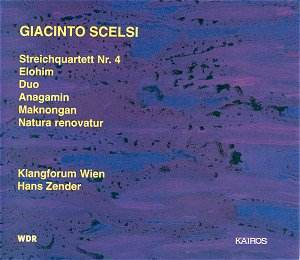"...thus it seems that sound is more important..."
"If you play a sound for a very long time, it
grows. It becomes so big that you start to hear many more harmonies,
and it becomes bigger inside ... all possible sounds are contained in
this sound from the start ..."
These words by Scelsi, quoted in the otherwise uninformative
notes, very aptly describe Scelsiís approach to music which he often
saw as an exploration of isolated sounds. This was already quite clear
in one of his early works, Quattro Pezzi (ciascuno su una nota
sola) of 1959, the title of which is self-explanatory.
All the pieces in this compilation obviously adhere
to Scelsiís single-minded approach. All, but Maknongan
of 1976, were composed between 1964 and 1967, and clearly reflect Scelsiís
preoccupations in sound exploration. In all these pieces there is very
little, if any, by way of melodic or rhythmical phrases. The music is
generally built on a few chosen pitches and variety is achieved by ways
of dynamic changes, varied length of note and different ways of "attacking"
the sound. The forces involved range from violin and cello in Duo
(1965), string quartet to small string orchestra in Elohim
(1965/7), Anagamin (1965) and Natura renovatur
(1967). However the end result often sounds the same and the whole leaves
a somewhat monotonous impression. Scelsiís orchestral music available
on ACCORD (200402, 200612 and 201112) has more variety and colour, and
may be a better introduction to this composerís single-minded musical
thinking. However Maknongan of 1976 is slightly different
even if globally it shares many characteristics of the earlier pieces.
There may be more variety and there is even some defiant attempt at
melody, no matter how simplified this may be, and this is probably due
to the fact that this piece may be performed either by a solo bass voice
or a solo double bass.
Scelsi was unquestionably a highly original personality,
both musically and as a man, whose idiosyncratic music can equally fascinate
or irritate depending on oneís frame of mind. He certainly was a considerable
artist who probably deserves neither the excessive praise he received
from certain circles nor the disdainful neglect in which he was held
by others.
For all I can judge, all these pieces receive dedicated,
carefully prepared and convincing readings. This release provides for
a fine survey of Scelsiís highly original output. However to those who
are not sure about Scelsiís music, I would suggest listening to the
ACCORD recordings of his orchestral music excellently performed by Jürg
Wyttenbach.
Hubert Culot
See
also review by Peter Grham Woolf


